So you want to remodel your home.
Maybe your kitchen is outdated and you’ve always wanted a beautiful new kitchen. Or, your bathroom is old and you would like to freshen it up with some spiffy new updates. Perhaps, now that you have some equity in your home, it’s finally time to finish your basement and turn it into a livable space with a kitchenette, a bathroom, and a couple of bedrooms where your family can stay or you can rent it out for some extra cash.
Whatever you are looking to do, one thing is certain, hiring the right contractor for your job is critical for your success.
We are not here to tell you that our company is the right one for you, in fact, we may very well not be. Instead, we have seen homeowners make the wrong choice in hiring a contractor and it ruins their lives. This one decision can have a profound impact on your life. We’ll explain with a quick real-life story.
Recently we met with a Realtor who was in the middle of remodeling her house. She was referred to a good contractor by her friend to do the project. The contractor was a great guy. He had a solid track record and had been in the business for over 30 years. This project was something he had done many times before so it would be a quick 6-week remodel project.
Well, a good first impression can be deceiving. This 6-week project turned into 6 months where she and her family were forced to live in the basement while the upstairs was gutted. The upstairs bathroom was unusable, the kitchen was incomplete, and the floors were ripped up. The contractor had stopped communicating with her, sent her change order bills demanding over $10k to cover framing costs, and left the project unfinished. And the cherry on top, the contractor was suing her for damages. The whole thing was a mess.
There are some bad apples out there, just like in any line of work, and many homeowners are not aware of the detrimental ramifications that can emerge from hiring a bad contractor. The magnitude of the decision can be significant.
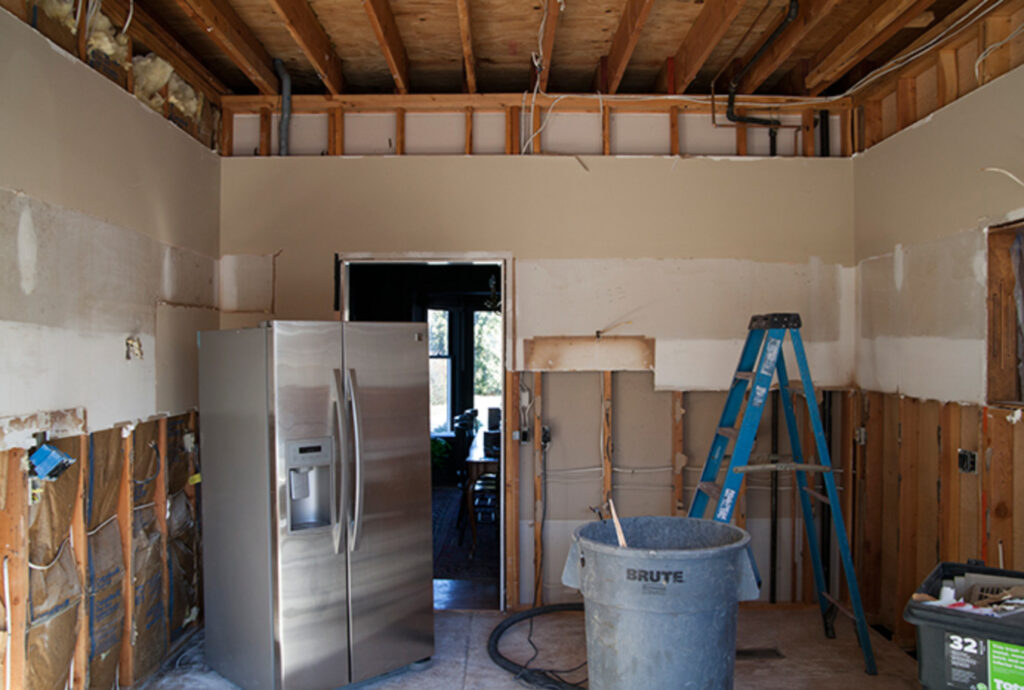
Avoid having your home left in this condition.
That’s why we created this guide. The goal is to show you how to choose the right contractor for your project and help you avoid making a costly mistake.
Hiring the right contractor for your job is crucial to ensuring your project is completed on time, within budget, and to your satisfaction.
A good contractor will manage the project from start to finish, handle all the bumps in the road, and will give you peace of mind knowing that everything is being taken care of in a professional manner. They will work with integrity, and transparency, and communicate regularly about the progress of the project. Anything unexpected that comes up you will be notified about immediately.
Your search may start with a referral from a friend, a search on Google or Houzz, or a post on social media. Below is an extensive guideline of things to do, ask, consider, and research when hiring your contractor. We hope this is a valuable resource and gives you insight into choosing the right contractor.
Research
1. Reviews
The first step is doing your research ahead of time before inviting a contractor to come to take a look at your project. Social proof is your friend. You want to search their business on Google and make sure they have Google reviews. Other review websites are important too. The most popular are Houzz, BuildZoom, and Yelp.
Read through the reviews. Obviously, the more 5-star reviews the better. You also want to look at the lower-level reviews – 1- and 2-star reviews.
- What is the customer complaining about?
- Was it actual work done and poor practices? Did the contractor take their money and run? Or was it because the contractor did not return their phone call?
You can weigh these reviews differently. Someone who actually hired the contractor and had a bad experience is a red flag. It is not the end all be all, but it should be noted. However, the person who did not get their phone call returned should not be used to weigh the contractor’s work.
This could be a sign of something more problematic, but for some reason in this business, contractors are slow to respond to customers. In fact, a lot of bad reviews are from disgruntled customers who did not get their phone calls returned.
That is another thing to note, does the contractor or someone from their team get back to you right away when you reach out? If they do, that is a good sign that they are on top of things and take their job seriously. There is an old adage,
“the way you do one thing is the way you do everything.”
Someone who is responsive on the first interaction will probably be responsive throughout the entire project. These are basic communication skills, which are important for projects to be successful.
Someone who is responsive on the first interaction will probably be responsive throughout the entire project. These are basic communication skills, which are important for projects to be successful.
Another thing to look out for is fake reviews. I didn’t think I would have to write about this, but this is a real thing. I have noticed contracting companies that all of a sudden got 20 or 50 new reviews overnight. That’s impossible for a contracting business to do. It takes at least a year to get 20 reviews – projects are time-consuming and each company has limited resources.
How do you tell if a company has fake reviews?
Someone who is responsive on the first interaction will probably be responsive throughout the entire project. These are basic communication skills, which are important for projects to be successful.
Another thing to look out for is fake reviews. I didn’t think I would have to write about this, but this is a real thing. I have noticed contracting companies that all of a sudden got 20 or 50 new reviews overnight. That’s impossible for a contracting business to do. It takes at least a year to get 20 reviews – projects are time-consuming and each company has limited resources.
The easiest way is to look at the reviews and see if there are a bunch of 5-star reviews from people with strange names that have only a few reviews to their name. There will be spelling mistakes in the reviews, weird run-on sentences that don’t make sense, and they just won’t come off as genuine. Here are a few examples of fake reviews:



These reviews don’t come across as real. They have spelling and grammar mistakes and some of the sentences don’t make sense.
Now for your reference, here is a real review that our client Lisa left us.
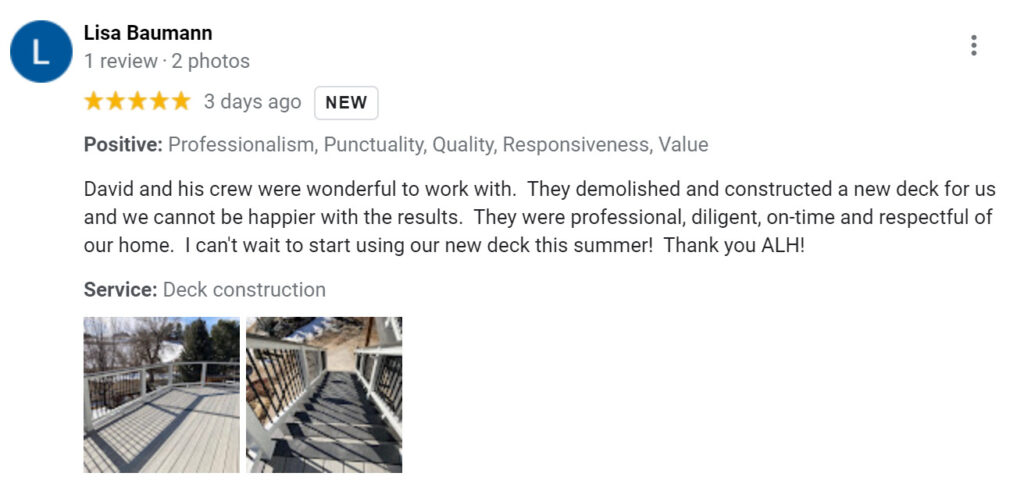
You can tell right away it’s real – there are pictures of the job. She also mentions David, one of our Project Managers. There are no spelling errors and the review is authentic.
Why are fake reviews a red flag?
Buying fake reviews is actually a normal reaction by a business owner. We work so hard to get good ones that a few bad ones can seem like the end of our business and livelihood.
But a business that buys fake reviews is taking shortcuts. Remember the adage from before, the way someone does one thing is the way they will do everything?
If a contractor is taking shortcuts and buying reviews, they are most likely covering up and trying a bury a bad review. You can actually see this when you look at the reviews in chronological order, after a bad review there will be 30 fake reviews trying to bury it. Unfortunately, the average consumer will not realize that a company has committed this infraction and will just look at the number of reviews and the score. But that does not tell the whole story. The system can be gamed.
Ok, let’s move on. Once you’ve vetted the contractor’s reviews, and they pass the review test, you now want to see a rating of at least 4 and above. Ideally above 4.5. If they have less than 10 reviews then a couple of bad ones can skew the results unfavorably. But as a rule of thumb, 4.5 and better, with all real reviews, is a good place to start.
2. Website
The next thing to look at is the contractor’s website.
The advent of the internet has increased the bar that business owners are held to and now websites are the modern-day portfolios. A tell-tale sign that a contractor does good work and is reliable and trustworthy is the quality of their website and pictures. A professional-looking website shows that the contractor understands business today and is savvy.
Alternatively, if someone today doesn’t have a website for their business, it raises an eyebrow. Having a website today is a necessity, in fact, if someone is in business and doesn’t have one we subconsciously categorize them as less credible.
To be frank, most contractors have terrible websites. I guarantee that when you’re doing your research you will see some that look like Berkshire Hathaway’s website. (If you haven’t seen their website, it looks like something from the Stone Age. Seriously, research it).
Just like fake reviews, having a poor website, or a non-existent website does not mean the contractor is bad. It is just another box to check to ensure that you are making the right decision with the contractor you choose.
When you’re on their website make sure to click around and look through the content. The more content the better. Look at the about page, past work or portfolio, the services they offer, core values or mission statement, history of the company, contact information, and reviews.
3. Social Media
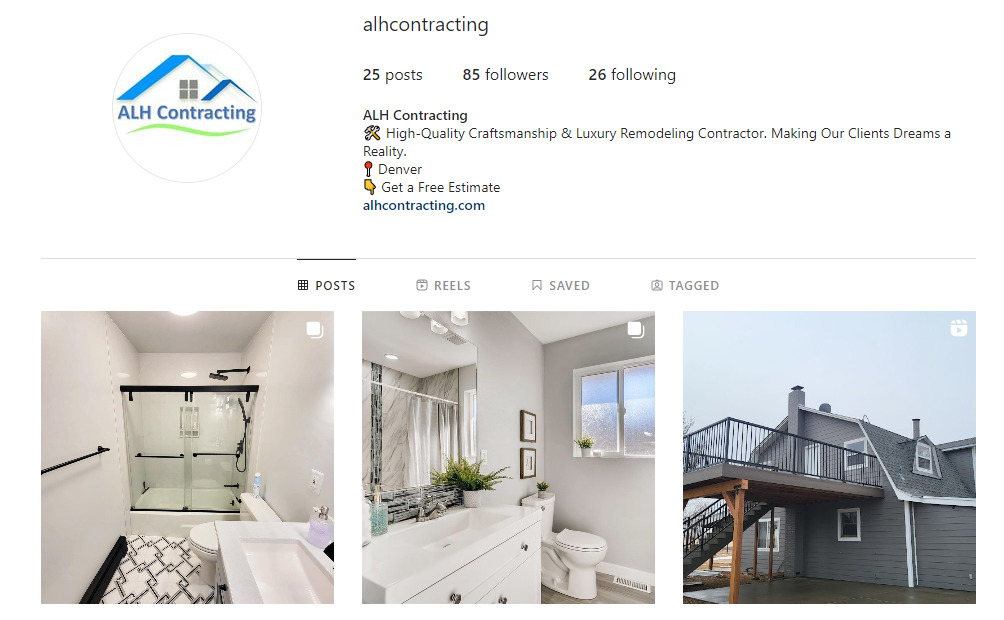
Another thing to look at, which is slightly less significant than the website, is the company’s social media accounts. The most important one today is Instagram.
Contractors are remodeling kitchens, bathrooms, and building additions. These projects lend themselves to beautiful photos for social media and Instagram. When you’re on their website, look for links to their social media and look at their Instagram, Facebook, and LinkedIn pages (if they have them).
If they have an Instagram account with lots of posts, and followers, and are actively posting then the contractor gets brownie points. This means they are taking their business seriously and going above and beyond to showcase their work.
In-Person Meeting
Once you have done your online due diligence, it is time to schedule an appointment with the contractor to come out and look at your project. Treat this like an interview. They need to answer your questions adequately and pass with flying colors.
It is critical that you have a few different contractors come out and give you estimates. Just like buying a car, you want to shop around and learn more about the market. It is advised to get at least 3 different estimates (generally, businesses offer an estimate free of charge, although some will charge for it).
Now it’s time to do your in-person due diligence.
The contractor, project manager, or construction superintendent will come out to your home and learn more about your project to give you an estimate. It is important to ask them questions about their process, experience, past projects, and references to get a better understanding of how they operate and the past work they have completed.
Here is a list of questions that you should ask every contractor to vet them:
1. Are you licensed, insured, and bonded?
First and foremost, you want to make sure that the contractor checks these boxes.
A General Contractor will have a license issued by the local jurisdiction’s Community Planning and Development department. Each county will require that the General Contractor is licensed with their jurisdiction in order to pull permits. If you are hiring a contractor to remodel your home, they should be the ones pulling permits under their name for your project.
As a side note, Denver is considered the hardest county to get your license in. The Denver County certification process is the most rigorous and demanding of any of the local jurisdictions. If a contractor is licensed in Denver, then you know they have gone through and passed a rigorous test.
Next, you want to make sure the contractor has insurance. Typically, contractors will have general liability insurance that is $1 million + in coverage. Make sure to ask to see a copy of their certificate of insurance. You want to confirm they have this and are insured. If they’re not insured, and something goes wrong, you could be liable!
Another thing you must check for is if the contractor has worker’s compensation coverage for their employees. If they don’t carry this insurance, you could be liable if a worker gets injured on your property!
Last, ask if the contractor is bonded. This is the least important of the three, but it is still essential. To become licensed in Denver a contractor must also be bonded. Bonding serves as a safety mechanism that protects you, as the customer, against any potentially illegal activities the contractor engages in. This doesn’t occur often, but it is another form of insurance for you.
2. Do you have your own W2 employees in-house or do you only use subcontractors?
You want to find out if the contractor has their own crew in-house, or subs everything out.
There is a big difference between the two. Subcontractors are completely separate entities from the General Contractor. A GC will hire subs to finish specific jobs the project requires. Common subcontractor trades include painters, carpenters, electricians, HVAC technicians, and plumbers.
Subs are common in remodeling projects but since they are separate entities, they are not “controlled” by the GC – they are essentially hired guns. This means that they work on their own schedule and terms, and show up when it’s convenient for them. They also are not always vetted by the GC. They aren’t subjected to background checks, and their work history can be unknown.
Now, because subs work on their own schedule, this can cause problems and headaches for both the GC and you the homeowner. For example, we recently spoke with a GC who only used subs and did not have any in-house workers. A client hired him for a major remodeling project, well above $100k.
When the project was scheduled to start nobody showed up. In fact, nobody showed up for the first 2 weeks. The homeowner was infuriated. They had just forked out a large sum of money to remodel their home and nobody was there to do the work for their job. How could this happen?
When the homeowner asked why no one was working on their project the GC had to describe the situation and tell them that the subs he hired were not his workers and he didn’t have control over their schedules. The homeowner was understandably upset.
If a General Contractor has their own W2 workers, then those employees work in-house for the GC. They are employees who have been vetted, passed background checks (make sure to ask your GC what the hiring process is like), and have demonstrated proficiency in construction.
The previous example where no one shows up to the job site would not have occurred. Instead, a dedicated crew would show up to start the project on day one and work until completion. There are no gaps in the construction timeline and projects get completed in an efficient manner.
Bigger projects may require subcontractors at some point. For example, here in Colorado, electricians, HVAC technicians, plumbers, and asbestos remediation specialists all require special licenses, so this work will usually be subbed out by the GC. The in-house crew does not usually include these specialty trades, although some of the workers may hold these licenses. So be sure to ask which trades the GC has in-house.
In summary, it is important for you to know beforehand whether the contractor will be subbing out all of the work, or if they have an in-house crew that will be doing the work. This will make a big impact on the outcome of your project.
3. Are you able to pull permits?
It is important to know if your General Contractor will be pulling the permits for the job. If they are not licensed in your jurisdiction then it would not be advised to use them, they will have to sub everything out.
Why is this bad?
The GC is not responsible for the work that is done and is not liable. They will have someone who is less sophisticated to complete the work.
Under no circumstances should you, the homeowner, be pulling permits. This opens to door to a ton of risk and potentially detrimental outcomes. First, you are now responsible for the quality of the work completed. If any problems arise, you are on the hook. Second, if anyone in that trade gets hurt or injured on the job, you are held responsible. That is one of the reasons GCs carry insurance and workers comp, to protect themselves against workplace accidents.
In conclusion, the GC should be pulling permits in their name for everything except specialty trades which require specific licenses. These include electrical work, plumbing, HVAC, and asbestos remediation.
3. Do you offer a warranty on the work completed?
You want to ask about the warranty for the work completed. Most builders and contractors offer some kind of warranty on their work. The coverage will vary by how long the warranty lasts, the type of job being completed, and the local laws.
The warranty information should be clearly spelled out in your contract so you know exactly what you’re getting and so you can reference it later if you need to. Make sure you understand the warranty.
The warranty will not cover everything in your renovation, and that is normal. One thing you may want to consider is adding additional insurance to your project and buying a home warranty. You can visit this link to see your options: https://www.2-10.com/builders-warranty/
4. What is your process from start to finish?
You want to learn what the process is going to look like from start to finish and get clarity on the entire scope of the project. Here is a list of questions you should get answered up front:
- When would the contractor be able to start on the project?
- When do I sign the contract?
- What is the deposit amount or percentage?
- What does the payment schedule look like?
- What is the typical timeline for a project of this scope?
- Do you anticipate any challenges with this project?
- What is your process for handling unexpected situations that may arise during the project?
- How many of these types of projects have you completed before?
- Will you be hiring subcontractors for the project? If so, which ones will be needed?
- How will the project be managed and supervised?
- Will you have a foreman or project manager on-site? How often will they stop by the project site to check on progress?
- What does a typical workday look like for your crew?
In addition to these questions, find out if they have a written document of the process from start to finish. Usually, a General Contractor will have an overview of the process from start to finish.
For example, you can see the process overview for ALH Contracting on our FAQ page here: alhcontracting.com/faq
Knowing the contractor’s process from start to finish will help you in making the decision on which one to choose. The one that can answer all the questions above and lay out all the steps involved will be a good indicator of how they conduct their business.
5. Do you have references you can provide from previous projects?
Back to social proof, which is important in making a decision.
You want to get a list of past client references that the contractor has personally worked with. Having a list of references demonstrates that the contractor is prepared and takes their job seriously. The more references they have the better.
You will want to contact these past clients and get testimonials from them firsthand. Ask them how the project turned out. Were there any challenges during the project? If so, what happened? How was it handled? How was the problem resolved?
Get a good idea of how the contractor operated, the quality of the work they completed, and the outcome of the project. If the contractor has many glowing and raving past customers, then that is a great sign.
Conversely, if they don’t have a list of past clients they can share, and don’t give a good reason why they can’t share it, then that is a red flag. You want to work with a contractor that has happy customers who are willing to show off their excellent work.
Feel free to reach out and ask us for our client references.
6. Do you have pictures, videos, or documentation of previous work?
A picture is worth a thousand words. A lot of times you will find the pictures, videos, and media of their work on their website or social media accounts. But they may not update it regularly. So you want to see if they have any new pictures of projects completed on their phone or computer.
Look over their completed projects to see the quality of their work. You want to get a good idea of what you can expect from them in terms of workmanship and craftsmanship. Pictures, coupled with the reviews and past client references will help validate their claims about the quality of their work.
6. Can I see a copy of your contract?
Getting a copy of their contract will show you a lot about the contractor’s process, how specific things are handled, and the ramifications of certain actions (default, disputes, delays in payment).
The contract is different from the estimate. The estimate shows the expected costs for the project including labor, materials, and permits. The contract is the legally binding document that sets the project in motion once it is signed.
Make sure you get a copy from the contractor to see how in-depth it is. For your reference here is a list of things that the contract should include:
- Permitting and how the payment is processed.
- Special order of materials and how they are handled/ordered.
- Payment for labor and material. How differences in the estimate and actual cost incurred are accounted for. How much is due at the beginning of the job.
- How unpaid invoices are handled and the fees associated with them.
- Date the work is to begin, and the approximate date in which the work is to be completed.
- How delays are accounted for and the different factors that affect delays.
- The scope of working with subcontractors.
- Working with specialty contractors – concrete companies, engineers, surveyors, etc.
- Insurance, the type obtained and providing a copy to the client.
- Workman’s compensation.
- Warranty information.
- Default and the ramifications of default by the client.
- Access to the job site and coordination with the workers.
- Remedies and the process to terminate the contract.
- The resolution process for any disputes including mediation.
- Amendments to the contract.
- Signatures by both parties.
The list of things above may not include all parts of a contract and is not meant to be legal advice. If you have any questions about a contract, you should consult with a professional lawyer or attorney.
Gauge how the interaction went.
The estimate and site visit is essentially an interview with the contractor. This part is subjective but evaluates how the interaction went.
- Did you get a good feeling about the contractor?
- Did they communicate well and show expertise and competence?
- Did you like how they answered your questions about the process, asking to see past client references, and getting a copy of their license, insurance, and contract?
It is important to have a few different contractors take a look at your project so you can compare and contrast how they responded to these different questions. Also, you get to learn about their process, how they differ, how they are the same, what the experience level is, and so on.
As an old saying goes, “trust your instincts. Intuition doesn’t lie.”
Price is not everything.
Remember that you usually get what you pay for. There is a famous saying (well, for entrepreneurs) that goes,
“Good, fast, cheap. Choose two.”
For example, in project management consulting, there is a triangle that illustrates the tradeoffs between cost, quality, and time to completion. The triangle below shows the different outcomes of a project.
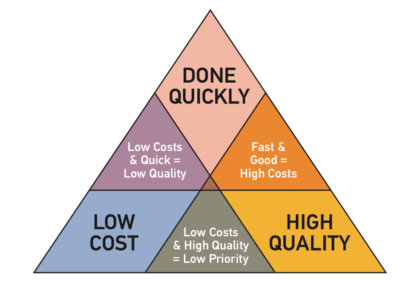
According to the triangle, if you want a really high-quality remodel, it can either completed in a quicker and more expensive manner. Or a less expensive and slower to complete/lower priority for the contractor. You will need to decide where you fall on this spectrum. There are other constraints that can affect the outcome of a project, but this is a good general guideline to use.
One very important thing to note, the lowest-priced contractor will have to sacrifice either quality or time to completion. This triangle holds up pretty well (it has been used since the 1950s) and if you go with the cheapest option, the contractor will either cut corners, “unexpected” costs will pop up, or the project will take a much longer time to complete.
The last thing you want is to end up like the Realtor who was imprisoned in her basement with her family, while the project had gone on 6 months past the completion date, with a gutted first floor and no work being completed.
🚩 Red Flags.
We have compiled a list of things to look out for when hiring your contractor. These are not meant to be rules set in stone – rather, guidelines and things to take into consideration when making your decision.
Things to watch out for:
- Requesting the whole amount upfront, or a large portion of the total. Do not pay for the whole job upfront, before any work has commenced. If this is in the contract, ask for a new one. The job is never paid for in full before work has started. This is when you hear on the news about a contractor who took the money and ran.
- If the contractor has fake reviews on their Google page or other review sites.
- If the contractor has a lot of bad reviews. Also, if they have a lot of disputes on the BBB.
- No website, social media, or online presence.
- If the contractor has no past client references or testimonials. They should have some happy past clients that are eager to vouch for the contractor.
- If the contractor is using all subs and does not have an in-house crew. They will be sacrificing the time to completion of your project and extending it for weeks, maybe months.
- If the contractor does not have a bonafide contract and wants to do things on a handshake.
- They are not properly insured.
- They do not have a general contractor license in your jurisdiction.
- Poor communication skills and taking a long time to respond to inquiries.
- Lack of experience and not having completed many projects in the past.
- Pushy or high-pressure sales tactics. No one likes a pushy salesperson; you want someone that follows up courteously and respectfully.
Checklist
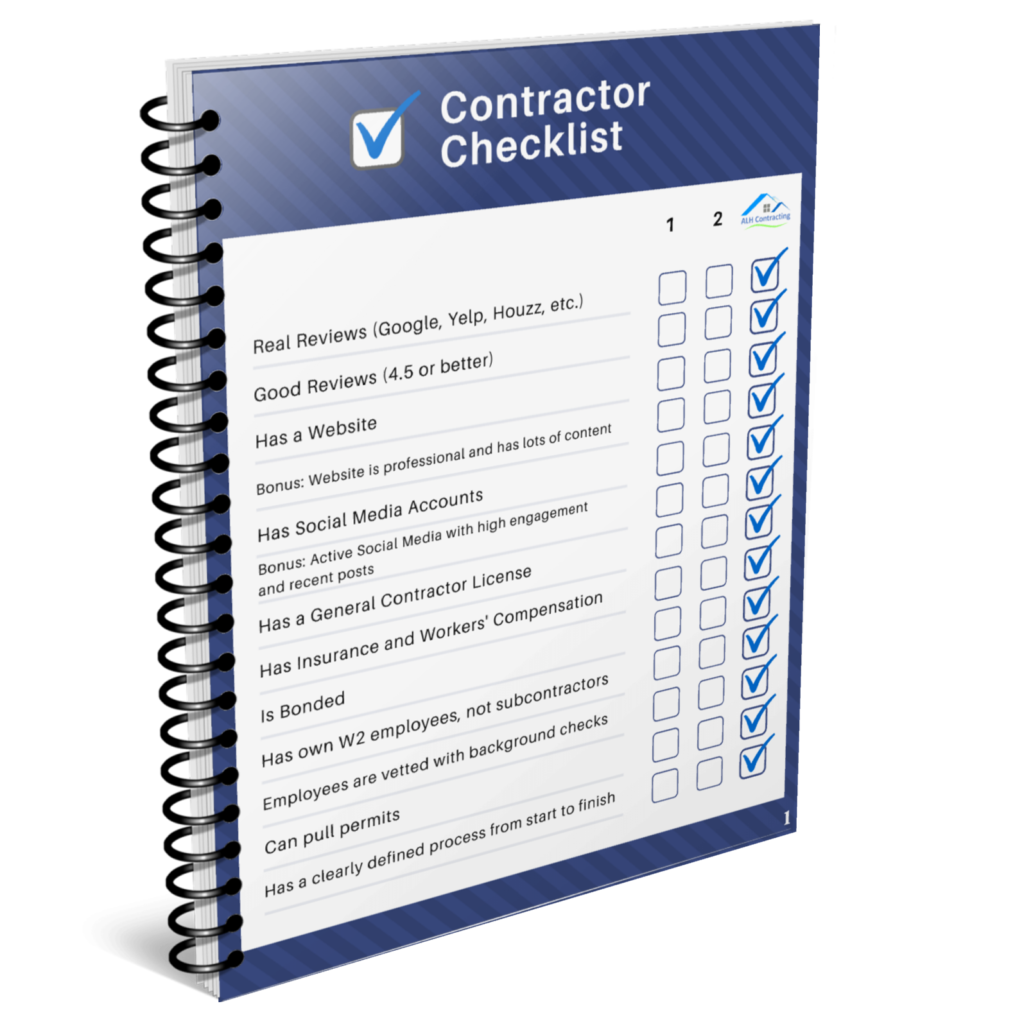
We have compiled a checklist of all the things to look for when hiring a contractor. You can go through this template to help compare and contrast the different contractors you interview for the job.
Conclusion
Choosing the right contractor for your project is a big decision. As you have seen, it can have a big impact on the outcome of your project.
Using the framework we have provided will help you make the right decision.
The rewards of a new kitchen, bathroom, basement, backyard, or addition can be profound. It can breathe new life into an outdated space, add functionality, and significantly increase the value of your home.
We hope you have found this guide helpful. Best of luck with your remodeling project!


